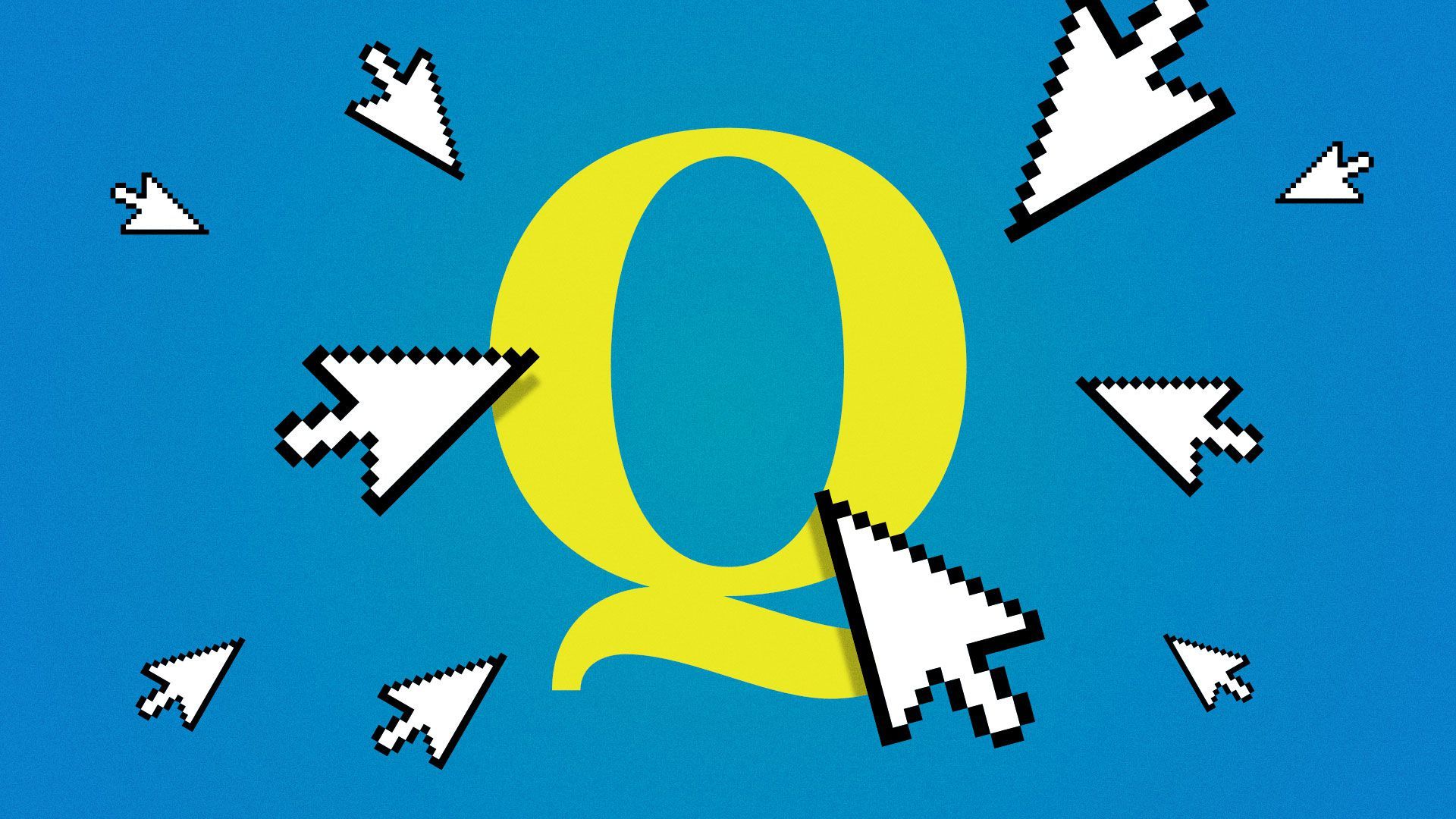QAnon's 2020 resurgence
Add Axios as your preferred source to
see more of our stories on Google.

Illustration: Eniola Odetunde/Axios
The strange realities of 2020 have perfectly played to the kind of fear QAnon thrives on, driving record online interest in the conspiracy theory.
Why it matters: QAnon is not just one fringe conspiracy theory — it's a sprawling network of falsehoods that's seeping into the mainstream. Its growing influence is sowing fear and confusion around some of today's most important issues, such as election integrity and the coronavirus pandemic.
Catch up quick: QAnon is a far-right conspiracy theory that alleges the "deep state" is engaged in a global fight to take down President Trump.
- QAnon rose out of the 2016 Pizzagate conspiracy theory and has grown into a decentralized network that analyzes cryptic prophecies dropped in remote online forums by "Q," who claims, without ever offering evidence, to be a Trump administration official with high-level clearance.
- Q maintains President Trump is secretly fighting a child-selling cabal in the U.S., though the conspiracy has spiraled to cover a vast array of claims, from JFK Jr. having faked his death to help Trump behind the scenes to the coronavirus being a hoax or a biological weapon engineered in either case by sinister elites.
By the numbers: Conspiracy theories tied to QAnon are growing more popular.
- There was more than 10 times as much Google search interest in QAnon in mid-July than in mid-January, according to Google Trends data.
- QAnon pages and groups on Facebook had nearly 10 times more likes at the end of last month than they did last July, according to data tracked by the Atlantic Council and shared with Axios.
- There has been a 190% increase in the daily average number of tweets with popular QAnon hashtags since March as compared to the seven months prior, according to data from GroupSense provided to Axios.
Parts of the mainstream Republican party have latched on, helping drive its conspiracy theories mainstream.
- 11 QAnon supporters are now 2020 Republican Congressional nominees.
- President Trump himself has retweeted QAnon followers at least 90 times since the pandemic began, and others in Trump's inner circle have also shared Q content.
Between the lines: For all its twisty logic and branching details, Qanon is premised on a simple narrative of the good working to vanquish the evil, who are responsible for all the world's ills. There are very real concerns that may be driving more people to that narrative.
- 2020's battered economy has spurred wide-ranging anxiety and uncertainty.
- Child trafficking, central to QAnon, has seen greater visibility, with the Jeffrey Epstein saga working as "gasoline poured onto QAnon embers, springing the theory back to life at a moment when some believers were suffering doubts," said Ethan Zuckerman, director of MIT's Center for Civic Media.
- Coronavirus has funneled what might otherwise be disparate conspiracy theories about cover-ups and global vaccine schemes into the grand unified theory offered by QAnon.
QAnon could pose real-world danger as it grows, scholars and analysts worry.
- Experts are particularly concerned it could undermine faith in democracy, with recent Q posts questioning vote-by-mail and election integrity.
- The web of misinformation expanding from within QAnon "definitely has real teeth," said Bryce Webster-Jacobsen of cyber intelligence firm GroupSense.
What to watch: Tech giants are starting to crack down on QAnon, but policies around it are inconsistent and may in some cases be easily dodged.
- Twitter recently shut down 7,000 Q-related accounts. It expects broader policy changes to limit the reach of another 150,000 accounts, per NBC News.
- Facebook removed five pages, 20 accounts, and six groups associated with QAnon for violating its content manipulation policies in May.
- TikTok blocked several hashtags related to QAnon last month from its search results, although some of the videos that originally had the hashtags may still be available on the platform.
Yes, but: Studies have shown that users are more likely to seek out bad information when a Big Tech platform flags it as false.
- "There's sort of this censorship backfire that happens, and people start becoming outraged that [a video is] being taken down and then sharing it more and more and more," said Zarine Kharazian, assistant editor at the Atlantic Council’s Digital Forensic Research Lab.
Meanwhile: New platforms such as Parler and TheDonald.win are giving the conspiracy theory places to spread unchecked.
- On Parler, which has attracted conservatives, Webster-Jacobsen said there are 10,000 to 15,000 new posts every day with the hashtags #QAnon or #WWG1WGA — which stands for the Q catchphrase "where we go one, we go all."
The bottom line: Trust in U.S. institutions is dangerously low, which creates a ripe environment for big-tent conspiracies such as QAnon.
- "In some senses, the QAnon conspiracy is a deeply comfortable one: the idea that pedophile alien lizard people led by Hillary Clinton are running everything is more comfortable than the truth that no one has their hand firmly on the tiller,” Zuckerman says.

